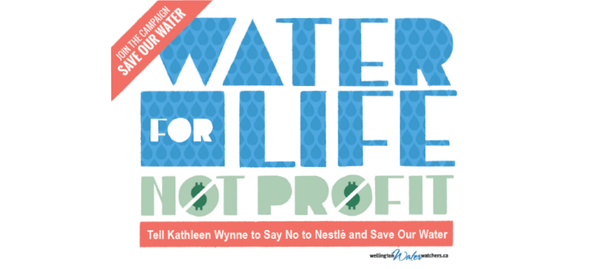From Vittel, France to São Lourenco, Brazil and Wellington County, Ontario, grassroots organizations are working together to stand up against efforts by Nestlé to privatize their access to water.
By Doreen Nicoll
Published April 09, 2019
What do a University of Guelph professor, a grandmother from Wellington County, and a Brazilian representative for the Catholic Church have in common? All three believe water is a human right.
In February, Wellington Water Watchers (WWW) Board of Directors Dr. Susan Glasauer and Karen Rathwell and WWW Campaign Director Mike Balkwill travelled to Vittel, France. They were there to find out more about the politics of water and the race to control the global water supply.

WWW Poster
The small agricultural community of Vittel is struggling to survive because Nestlé corporation has purchased much of the land surrounding their wells in order to establish rights to the water. The price of land has increased to levels making it unaffordable for young farmers and their families.
Nestlé then offers the land back to farmers free of charge as long as they follow the rules laid out by this international corporation. The rules are very complex but very clearly state farmers have no access to the water below the land. Instead, farmers are expected to truck in water to irrigate their crops.
Vittel is known for its cherry trees, but the trees have failed to bloom for five straight years due to a lack of water and nutrients. Even rain water is not absorbed by the soil because of the lack of moisture in both the soil and the atmosphere.
According to Rathwell, "Nestlé claims it reconciles private interest with the collective good." Unfortunately, Vittel's farmers are not reaping economic or environmental benefits from this one-sided agreement. And, trains once used to carry people to and from Vittel now transport only bottled water mainly bound for Germany.
Nestlé's wants consumers to purchase bottled water for drinking and they have established over 100 bottling operations worldwide to fill this manufactured need. The bottling plant in Aberfolye, Ontario bottles the 4.7 million litres per day pumped from the Aberfoyle and Hillsburgh wells. Nestlé is also working on getting a permit to extract water from the Elora well it recently purchased.
That means Nestlé could be bottling the equivalent of 919 Olympic pools per year from this one aquifer. Significant amounts of greenhouse gases would also add to climate change as a team of non-stop tanker trucks transports water from Hillsburgh and Elora to the Aberfoyle bottling plant.
Dr. Glasauer's work focuses on wetlands. She talked to farmers in Vittel who said that the soil in the region has become drier and the atmosphere has become less humid since Nestle began operations there.
Climate change is also impacting this area. When an ecosystem is under drought stress, removing water from the watershed by groundwater pumping increases stress on plants and wildlife. Glasauer points to the fact that one sheep farmer in Vittel now makes four trips per day to haul enough water to keep his sheep alive.
Because local laws in Vittel are quite lax, Nestle has been able to draw 800 million litres of water per year for the past 30 years. The aquifer has been unable to replace the three and a half centimeters of water that is removed annually. If Nestlé were to stop taking water, the aquifer would be able to recharge.
Locals and Nestlé agree that the water will be drained from Vittel's aquifer within the next 20 years. Instead of placing a moratorium on taking water, the French government is considering building a water pipeline from a neighbouring community to bring water to the citizens of Vittel so Nestlé can continue pumping.
Nestlé's master plan involves buying land and building bottling plants in economically-depressed areas, typically rural communities, around the world. The potential for jobs is the incentive for communities to turn a blind eye to the environmental consequences.
The fallout from some of the company's operations in São Lourenco, Brazil caught the attention of Brazil's Catholic Church. Brazilian water activist Franklin Frederick arrived in Switzerland several years ago as part of an assignment by the Catholic church in Sao Paulo to secure the support of Catholic and Protestant churches in Switzerland in a campaign against Nestlé water-bottling operations back home.
Frederick shared with WWW members that his work has uncovered co-operation between Nestlé and the Swiss government against non-profits opposed to Nestlé's operations. In 2008 it was revealed that Nestlé employed Securitas, a well-known security company in Switzerland, to infiltrate the grassroots group ATTAC, which was critical of Nestlé operations, including in Colombia and Brazil.
Franklin also shared that Nestlé has contracts for catering food and water for U.S. military bases around the world. When combined with $9.5 billion in water sales per year, this gives Nestlé access to virtually all global markets.
"Who controls water controls society," says Frederick.
If Nestlé is prepared to keep extracting water until the aquifer is depleted in Vittel, then there is no reason to believe its claims that its water-taking in Ontario is "sustainable." It's time to say NO to Nestlé because water is for life, not profit.
To find out more about WWW, visit their website: http://wellingtonwaterwatchers.ca/
To read dispatches of Mike Balkwill (WWW campaign director) with more details, visit his blog.
A version of this article originally appeared online @nowtoronto.
You must be logged in to comment.
There are no upcoming events right now.
Why not post one?